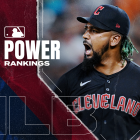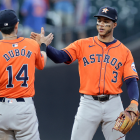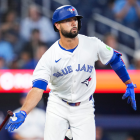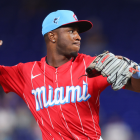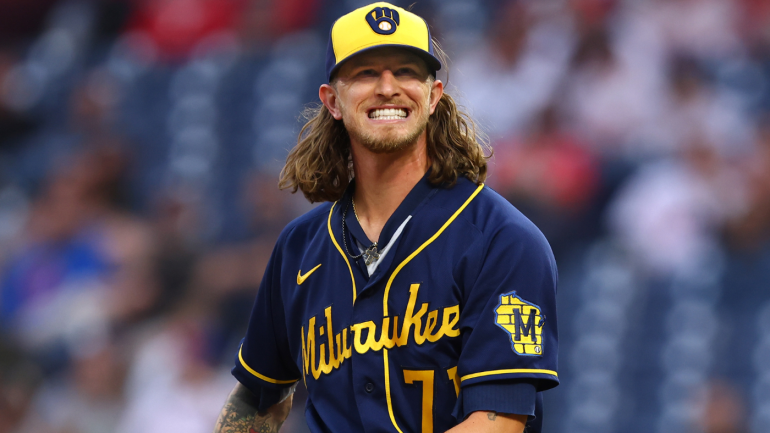
The Milwaukee Brewers have agreed to trade closer Josh Hader to the San Diego Padres, CBS Sports HQ's Jim Bowden confirmed Monday. Milwaukee will receive reliever Taylor Rogers, right-hander Dinelson Lamet and prospects Robert Gasser and Esteury Ruiz in the deal that comes less than 30 hours before Tuesday's trade deadline.
Hader, 28 years old, will qualify for free agency after next season. Because of that, and because of his rising arbitration costs (saves are the one statistic that gets a reliever paid before they hit free agency), the Brewers had been more open-minded about moving him than you might expect from a first-place team.
It's possible that the Brewers felt more empowered to make a deal given that Hader is in the midst of a disappointing effort relative to his norms. In 37 appearances, he's amassed a 4.24 ERA (97 ERA+) and a 4.92 strikeout-to-walk ratio. (For reference, even with his struggles this year, he still has a 2.48 career ERA.)
Hader had been particularly ineffective as of late, with his seasonal ERA increasing from 1.09 at the beginning of July to 4.24 by month's end. Five of the seven home runs he allowed this season were launched over the span of six appearances.

Fantasy Baseball Today Newsletter
Your Cheat Code To Fantasy Baseball
You're destined to gain an edge over your friends with advice from the award-winning FBT crew.
Thanks for signing up!
Keep an eye on your inbox.
Sorry!
There was an error processing your subscription.
The Brewers didn't necessarily have to have long-term concerns about Hader to justify moving him -- they just had to feel that they could get similar production from Rogers, with the other players serving to balance the fact that Rogers will be a free agent at season's end, a year earlier than Hader. How realistic is that belief? Rogers has also had a worse year than usual, accumulating a 4.35 ERA (87 ERA+) and a 5.33 strikeout-to-walk ratio in 41 innings. For his career, he has a 3.29 ERA in more than 350 big-league innings.
Sportsline projects the trade to favorably impact San Diego in 2022. The Padres' chances of making the playoffs increased from 68.9% to 70.7%, while Milwaukee's decreased slightly from 78.8% to 78.2%.
Looking for more insight on the Hader trade? Fantasy Baseball Today broke down the deal on an emergency episode. Listen below:
What the trade means for the Brewers
Foremost, it means that Milwaukee will have a regular closer who isn't Hader for the first time since he took hold of the ninth inning in 2018. The combination of his recent struggles (as mentioned above) and Devin Williams' continued excellence should make that thought easier to bear for Brewers fans, though it's reasonable to think Milwaukee's bullpen as a whole might take a step backward as a result. (That drop, the Brewers front office seems to be banking on, can be offset with Rogers.)
Hader's departure will also free up funds for the Brewers to allocate elsewhere. He was owed $11 million this season, making him the second highest paid player on Milwaukee's roster, behind Christian Yelich. Granted, the savings won't be felt immediately: Rogers had a full-season salary over $7 million, meaning the difference the rest of the way is less than $2 million between them.
The Brewers also get some additional pitching depth in the form of Lamet, an interesting young hitter in Ruiz, and Gasser, who Baseball America recently ranked as the ninth-best prospect in San Diego's system and a potential back-end starter
What the trade means for the Padres
It's simple. The Padres were able to acquire Hader, possibly the game's best reliever over the course of his career, for a package of extraneous players. Rogers had underperformed and was months away from free agency; Lamet had not demonstrated he belonged on a big-league pitching staff; and neither Ruiz nor Gasser were one of the Padres' best young prospects.
It's rare to be able to land a potential impact talent -- even in the form of a reliever -- without giving up a player the team will definitely miss. The Padres accomplished that here. Even if there is a chance that Hader is on the downswing, it's a worthwhile bet. One that could upgrade the Padres' bullpen without jeopardizing their pursuit of Juan Soto or other trade-deadline additions.










